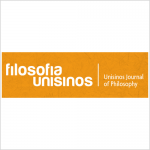Søren Kierkegaard under the pseudonym Johannes Climacus and Aurelius Augustine on Time, Eternity and Truth
Vol 19, No 2 (2018) • Filosofia Unisinos - Unisinos Journal of Philosophy
Autor: Humberto Araujo Quaglio de Souza
Resumo:
In spite of the relevance of Aurelius Augustine (354-430) for the intellectual environment in which Søren Kierkegaard (1813-1855) lived, the studies concerning the relations between these two thinkers are still incipient. In this field of investigation, one of the most intriguing questions is the fact that Kierkegaard apparently changed his view of the Bishop of Hippo, going from admiration during the decade of 1840 to disapproval during the decade of 1850. This paper intends to examine how the problems of truth and of the relations between time and eternity, as approached by Augustine in his works Confessions and The Teacher, are strongly related to the Christian doctrine of creatio ex nihilo, and how the arguments developed in these Augustinian books can be read as presuppositions of the arguments that support the Kierkegaardian idea of Absolute Paradox developed centuries later by the Danish philosopher in his book Philosophical Fragments, published under the pseudonym Johannes Climacus in 1844, when the thinker of Copenhagen still seemed to express a great admiration for the Roman-Berber priest of Late Antiquity.
ISSN: ISSN: 1984-8234
Texto Completo: http://revistas.unisinos.br/index.php/filosofia/article/view/fsu.2018.192.03
Palavras-Chave: Kierkegaard,Augustin,time,eternity,truth

Filosofia Unisinos - Unisinos Journal of Philosophy
The journal Filosofia Unisinos - Unisinos Journal of Philosophy is published once every four months by Universidade do Vale do Rio dos Sinos.
Articles must be original, unpublished, and not under consideration for publication anywhere else and can be written in Portuguese, English or Spanish
Filosofia Unisinos - Unisinos Journal of Philosophy prints articles, translations and critical book reviews. It also reprints papers that are considered fundamental to the area when authorized written permission is given by the original publisher.
